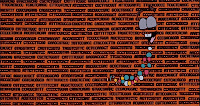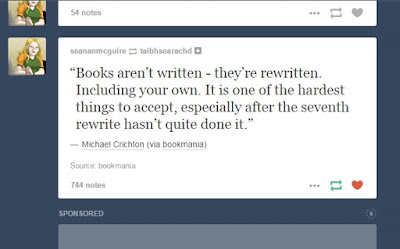Okay, so I’m about neck-deep in a draft right now, racing a deadline, and was a little worried I wouldn’t have time for a ranty blog post this week.
Then, lucky for all of us, I got a message from Kristi Charish.
I’ve mentioned Kristi twice or thrice here before. She’s—and I’m not joking—an archeologist turned genetic engineer turned fantasy author. No, seriously. She’s pretty much solely responsible for making me like urban fantasy for the first time since college. The first book in her Kincaid Strange series, The Voodoo Killings, is finally available in the US as a paperback, so you should go grab a copy.

Anyway, because we live in different countries with a sizable chunk of North America between us, it was a special treat to get to hang out with Kristi in person at Phoenix Comic Fest last month. There were many drinks and meals, and much talk about writing and publishing. Including one very interesting discussion about teaching, fueled by her much more academic viewpoint.
And then a few days ago, as I was wondering if this’d be a skip week for the ranty blog, Kristi got in touch with me and asked if I’d be interested in that discussion as a guest post…
So here’s Ms. Charish with her informed thoughts on writing, higher education, and success (with a bunch of random links from me to semi-related posts I’ve made here)
——————————————-
Maybe you’ve always dreamt of being an author, or perhaps you’ve recently begun to dabble in prose on your off time. Maybe you’ve entertained fantasies of seeing your name on your book as you pass by the window of your favorite bookstore? Or, better yet, coming across the fruit of your imagination while surfing on Netflix.
Fantastic! We like dreamers. Welcome to a profession that attracts a damnably eccentric mix of eclecticism!
But you’re new to the game, and like the studious person the western schooling system has honed you to be, you feel compelled to expand your education, broaden that nebulous toolbox of literary-like writing and story-telling skills the critics, pros, and amateur spectators alike keep going on about.
You’re considering courses, a workshop – maybe even – gasp – an outright, all in, financially crippling, higher degree!
Do I encourage pursuit of the full-fledged-degree-kind in the pursuit of writerly knowledge? Absolutely. By all means, pursue a higher education. Do a degree, ANY degree.
…Whatever you do don’t make it an MFA in creative writing, and here’s why.
The World’s Bestest Heart Surgeon
Imagine you are the head of a prestigious medical school and you are a great heart surgeon – one of the world’s best. You’re so good at being a heart surgeon, you think you know the secret to training them. So much so you decide that over the next four years, you’re going to concentrate all your resources on proving you can.
You meet with the rest of the staff (well, mostly the four other heart surgeons…) and all of you agree producing the world’s best heart surgeons is a worthy pursuit. It’s your duty as patrons of the heart surgeon caste to make more heart surgeons. You cut back on all the nonsense and distractions – pediatrics, infectious diseases, family medicine, dermatology – anything that doesn’t pertain to becoming an awesome, world’s bestest heart surgeon until the courses are all about heart health and surgery.
500 students, a staff on board, a university endowment, plus all that tuition? It’s a bet you can’t lose! Heart Surgeon World Awards, here we come!
Time travel four years and, low and behold, you have in your graduating class two of the world’s most up and coming heart surgeons! Everyone is gushing over their surgery technique and breathlessly anticipating the next research article. As an institution you have achieved world acclaim – Success!
…At least until everyone starts asking what happened to the 498 other students…you know, the ones who didn’t make the World’s Best Heart Surgeon cut?
Six other students had a natural aptitude for heart surgery. Not world’s best, but they go on to productive if not lucrative careers. Another ten aren’t cut out for surgery – the stress, hand eye coordination, can’t stand 7 hours without taking a pee – but they can teach. A couple get jobs at instructors at other universities.
…that leaves 482 students. Students who were talented, clever, and industrious enough to get into medical school but for one reason or another didn’t make the heart surgeon cut. A lot of them would have made fantastic dermatologists, pediatricians, family physicians, nephrologists, epidemic specialists, etc, but, well, after four years listening to their professors go on about how this was the best medial school because it only trained heart surgeons, and how heart surgery was the only surgery worth performing, any other pursuit of medicine is a waste of time and meant you were second rate…Eventually they drink the Kool-Aid. Most never pick up a medical tool or book ever again, and the few who might have?
Shame they can’t since they’ve had no other medical training whatsoever.
But… you know… two World’s Best Heart Surgeons/500 students. Sometimes you need to sacrifice a cow…or was it an army?
Look, we’re going to need your entire student body. Don’t ask why, just trust us it’s for the greater artistic good…

If the Greatest Heart Surgeon Medical School was real it would be considered a resounding failure. Any program – history, life science, biology, forestry- run that way would be shut down – fast – because everyone grasps that there is more to medicine and a robust medical community than heart surgery and wasting 80% of your student body trying to mold the best isn’t just wrong, it’s stupid, idiotic, asinine, the work of a delusional heart surgery megalomaniac.
Yet that’s what the majority of MFA creative writing programs do.
Writing is an important communication and entertainment medium. It’s a way to discuss ideas, cultural shifts, politics – you name it – in ways that can’t be done with YouTube and FB articles. It’s storytelling. And just as in medicine where many disciplines are necessary to get the full picture, many kinds of writers and media make for a healthy and entertaining writing community. There’s no one right way or right type of novel to produce.
Yet what I described above for the World’s Best Heart Surgery School isn’t too far off from how the majority of MFA programs are run. Damn the rest of the writing and entertainment world – we produce literary geniuses here! There’s a history there that Peter
touched on in a previous post but it boils down to this: The inception of the Creative Writing MFA program wasn’t catalyzed by a desire or need for more novelists. They were invented as a Post-World War 2 tuition grab – a student holding cell. It’s morphed a bit over the last 80 years but the essential building blocks remain.
Creative Writing Programs claim to be a pursuit of excellence in literature (FYI – probably
not the kinds of book I, Peter, or anyone else who’s ever guested on this blog writes). But, funny thing, when you ask how well the writing careers are going for the majority of alumni (not the two or three prodigy examples they trot out), they tend to waffle on about how a degree in creative writing is about personal growth, not vocational training (AKA: tuition/student holding cell).
Well, I call bull…
You Really Don’t Need an MFA to be a Serious Novelist
Back to the World’s Bestest Heart Surgery School, the university president has stopped by to scream about the incredibly poor vocational success of, well, most of your graduates. Like always, you hold up your two gifts to heart surgery Godhood (full disclosure: I don’t think the MFA success rate is anywhere near that high)…
And find out that the History, Biology, and Marine Biology departments have all also produced three equally gifted heart surgeons who are outcompeting yours.
It’s incredibly unlikely that a History program would produce a heart surgeon– there are very specific things you need to learn like heart anatomy and how to cut someone open without
killing them.
But creative writing is weird. You can learn to write almost anywhere. Law school, journalism, real medical school. Not only can these vocations inspire you, but unlike and MFA, which purports to teach you how to be literary, these other disciplines are trying to teach you something else entirely – they’re trying to teach you how to communicate the ideas you learn to the outside world. That’s priceless. That’s called perspective, and it’s what makes the writer and writing interesting, engaging.
A great example is Carl Hiaasen, who was a journalist in Florida for many a year before he became a
NYTbest-selling satire novelist. What does he write about? Corrupt politicians making scuzzy land deals in Florida, the war being waged on the beautiful everglades, and the very few and far between honest people who are trying to save his beloved state. It’s captivating, its relatable, he knows his material well and he communicates in a way that makes millions of readers care too.
Much like the World’s Best Heart Surgery School doesn’t see the point in pediatricians, I worry that most MFA programs don’t see the merit and value of a Carl Hiaasen book.
And he’s not the only example. Would Michael Crichton have written such a captivating novel about
a deadly extraterrestrial virus or
bringing dinosaurs back to life if he’d done an MFA over medical school? Diana Gabaldon of
Outlander fame holds three degrees in science, including marine biology, and it shows in all the science she trickles through her novels.
> It’s a distinct possibility that my alma matter’s Department of Science has produced more successful novelists in the last ten years than MFA Writing Program…
Claiming to teach literary artistry is all fine and well but there has to be some kind of tangible real-world, quantifiable measurement of success, otherwise it becomes a nebulous black box, a dark corner…. And nebulous boxes and dark corners are where things from 80s horror movies and Peter’s books hide, so if that’s the only reason you decide to skip the MFA so be it.
The point is you (and your bank account) really don’t need an MFA to be a great writer.
But I really want to improve my writing, and, you know…writing rules.
Disclaimer aside, if you are hell bent on burning money or feel you really need the support, these are some options I can recommend.
Cheapest/ Best Value: Writing groups/coffee house meet-ups. Free for the price of a coffee. Google your area but I hear
The Writer’s Coffeehouse is popular.
Cheap/ Good Value: Community Centers/Library writing programs. Average 6 weeks to 2 months a couple nights a week and range Free -$100. Often run by a published author vetted by the community center.
Medium priced/ Still Good Value: Community College Writing Classes. Evening or afternoon classes that run roughly six to eight weeks and cost anywhere from $120-200. Bonus: Instructors often have teaching credentials.
Expensive/Questionable value/not recommended: All Star/Celebrity/NYT Bestselling/Intensive Author Workshop and/or Cruise. They range from two to six weeks, cost upwards of four grand, and often boast a rotating roster of world class authors as instructors. You do get one on one time with the authors as advertised and that might be incentive enough for the odd superfan. I don’t recommend them. The instructors might be star studded novelists but that doesn’t mean they can teach and their alumni track records leave much to be desired. In comparison, self-driven, free writer’s groups have a staggering publication success rate. A new laptop and a trip to a remote cabin to write is arguably a much better return









